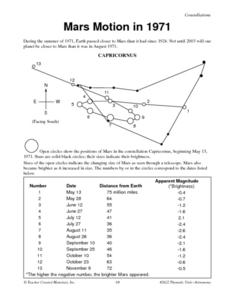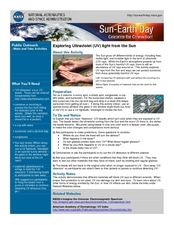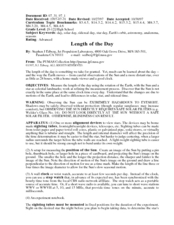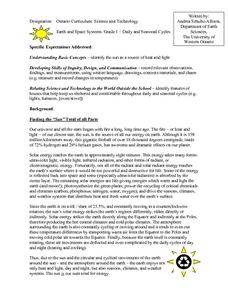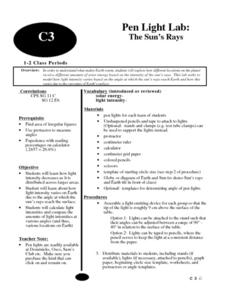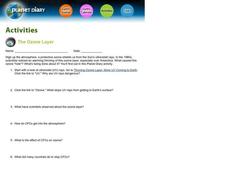Curated OER
Mars Motion in 1971
In this science instructional activity, students read about the summer of 1971 when the Earth passed closer to Mars than it had since 1924. Students also learn about the retrograde motion of Mars as seen from Earth.
California Academy of Science
Kinesthetic Astronomy: Moon Phases
We are the world! Each of your class members models Earth and holds a styrofoam ball to see its phases. Thorough teacher background information and a detailed lesson plan will make this a cinch to teach. If you do not want to purchase...
PBS
Ocean Circulation in the North Atlantic
Swirling and churning, the waters of the North Atlantic play a vital role in Earth's climate! Discover the many factors that produce circulation using a multimedia lesson from PBS's Weather and Climate series for high schoolers. Scholars...
Curated OER
Seasons Worksheet #3
A diagram outlining the geocentric view of the sun's path across the sky tops this earth science instructional activity. Learners label the zenith and determine the latitude from which this view is taken. It is a compact instructional...
Curated OER
Exploring Ultraviolet (UV) Light From the Sun
Learners identify the different energy given off by the sun. In this earth science lesson, students predict where the UV beads will turn the darkest color. They explain the importance of using UV protection.
Curated OER
The Four Seasons - Earth's Rotation
Students identify characteristics in correlation with each season and identify dates of the changing seasons. They identify and describe how the Earth rotates around the sun and its effects on the temperatures of the earth.
Curated OER
Seasons on Earth
Students examine how seasons occur and explore how the different angles effect surface heating. In this climate lesson students interpret satellite maps of the world that show seasonal differences in plant life.
Curated OER
Wobbling in Circles
Sixth graders role play the parts of the sun, the moon and the Earth as they simulate the concepts of revolution and rotation. They act out the parts in small groups and discuss the concepts as a class.
Curated OER
What Causes the Seasons?
Students conduct experiment to examine how tilt of globe influences warming caused by lighted bulb. They monitor simulated warming of their city by sun in winter and in summer by using light bulb, interpret results, and submit lab report.
Curated OER
Length of the Day
Young scholars investigate how the Earth's rotation affect the length of day. In this earth science lesson, students construct a sighting apparatus and record their observations over a few days. They analyze data collected and formulate...
Curated OER
Spinning into Space
Students, through hands-on activities, teacher demonstrations, pictures, and informational books, complete a unit on the Earth and its place in the Universe. They make mobiles of the Milky Way and watch demonstrations of lunar and solar...
Curated OER
Daily and Seasonal Cycles
First graders identify the sun as a source of heat and light. They identify features of houses that help keep use sheltered and comfortable throughout daily and seasonal cycles. Students are told that summer is the best season to...
Curated OER
The Reasons for the Season
Students explain the reason for the changes in season. In this lesson examining the relationship between the Earth and the Sun, students use an applet to discover how the alignment of the Earth and the Sun cause the change in seasons.
Curated OER
Pen Light Lab
Students study what makes Earth warm and explore how different locations on the planetreceive different amounts of solar energy based on the intensity of the sun's rays. They calculate light intensities and compare the
amounts of light...
Curated OER
Voyage: A Journey through our Solar System
Young scholars build the Voyage scale model of the Solar System on a playground and "travel" to each planet. They recognize that the Sun and planets are tiny worlds in a vast space, giving them a new perspective on the Solar System, and...
Curated OER
Bellwork Week 20-Space Science
In this space worksheet, students answer questions about the size comparison of the moon, Earth, Solar System, Virgo Cluster, Milky Way Galaxy, and Universe, they answer questions about the Milky Way Galaxy and they sketch the life cycle...
Alabama Learning Exchange
The Solar System
Learners explore the Solar System. In this cross-curriculum space instructional activity, students identify the planets, name them in order according to distance from the sun, and describe major characteristics of each planet. Learners...
Curated OER
Solar Cycle
Students explore the solar cycle through a series of experiments. In this space science lesson, students construct and evaluate solar cycle graphs. They explain how this phenomenon affects the Earth.
Curated OER
Satellite Technology
In this satellite technology worksheet, students read about Low Earth Orbit satellites and the frictional drag from the Earth's atmosphere that causes them to fall back towards the Earth. Students use given data of the years the...
Curated OER
A Moon with a View
Third graders explore the rotation of Earth and the moon. For this solar system lesson, 3rd graders participate in an Earth and moon simulation in which part of the class "becomes" the sun, while other children represent the moon by...
Curated OER
Why do Stars Rise in the East?
In this stars rise in the east worksheet, students use geometry to show how the Earth rotates from west to east and why celestial bodies appear to rise in the east and set in the west. Students draw a figure and label given points in...
Curated OER
The Ozone Layer
In this ozone instructional activity students complete an interactive activity on the thinning of the ozone then answer a series of questions on the earths UV rays.
Curated OER
Shoot for the Moon
Second graders distinguish the different phases of the moon. In this astronomy lesson, 2nd graders study the history of its discovery and myths about its origin. They simulate how the moon's surface is illuminated by the sun.
Curated OER
Our Moon
For this space science worksheet, students use the clues given at the bottom of the sheet to solve the crossword puzzle on our moon. They name another name for the moon and the moon's gravity compared to that of the earth.
Other popular searches
- Earth Moon Sun System
- Earth Sun and Moon
- Earth/sun/moon
- Earth and the Sun
- Earth, Sun and Moon
- Earth and Sun
- Earth Moon Sun
- Earth Rotation Around Sun
- Earth and Moon and Sun
- Earth Orbit the Sun


